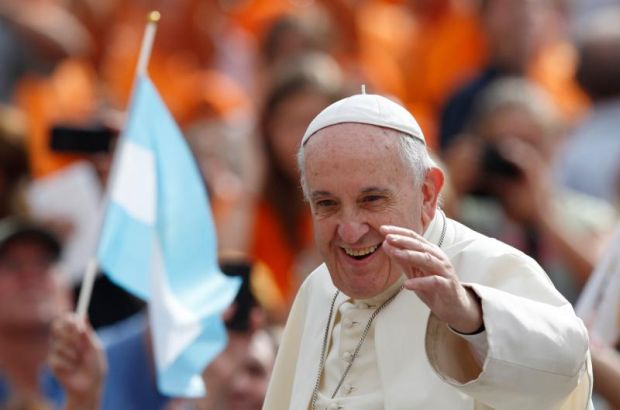VATICAN CITY (CNS) — The smile and love of a family can light up the world, bringing warmth and hope to communities that have become cold, lifeless and depressed, Pope Francis said.
“No economic and political engineering is able to substitute this contribution from families,” he said Sept. 2 during his general audience talk in St. Peter’s Square.
Unlike the ancient city of Babel’s “skyscrapers without life,” he said, “the Spirit of God, on the other hand, makes deserts bloom.”
[hotblock]
The pope’s catechesis on the family looked at the importance of Christian families living out their faith and sharing it with others. By experiencing God’s love, families “are transformed, are ‘made full'” to overflowing with a sense of going outside themselves to embrace all people, especially those in need, as brothers, sisters, sons and daughters, he said.
Understanding what is real love and affection, which can never be bought or sold, “is the best inheritance” one can receive from one’s family, he said. The “grammar” of love is learned in the family, “otherwise it is quite difficult to learn.”
But people are asked to live their family life within God’s plan, he said, and in “obedience to the faith and in covenant with the Lord,” which protects families, “freeing them from selfishness, safeguards them from breaking down, brings them to safety for a life that never dies.”
Families living in covenant with God “are called today to counter the desertification of communities in the modern city,” Pope Francis said.
Today’s cities have become barren places because of “a lack of love, a lack of smiles.” One can find plenty of entertainment, lots of things to do “to kill time, to have some laughs, but love is missing,” the pope said.
The father or mother who can smile despite being busy with work and family — theirs is the family that is “able to conquer this desertification of our cities;this is the victory of love of the family,” he said to applause.
“We must get out of the towers (of Babel) and vaults of the elite in order to once again spend time in homes and places open to the multitudes, open to the love of the family,” Pope Francis said.
This “communion of charisms” of men and women living the sacrament of marriage or consecrated life “is destined to transform the church into a place fully familial for an encounter with God,” he said.
Families living out the Gospel and God’s love are “a blessing for the people: bringing hope back to the world,” he said. Their example and actions are able to do things thought to be “inconceivable.”
“Just one smile miraculously eked out of the desperation of an abandoned child, who starts a new life,” Pope Francis said, “explains the workings of God in the world to us better than a thousand theological treatises.”
All those men and women who sacrifice and take risks for children who aren’t their own “explain things about love to us that many scientists no longer understand,” giving further proof that actions and gestures from the heart “speak louder than words,” he said.
The pope asked people to imagine what the world would be like if history, society, the economy and politics were to be finally guided by men and women working together, leading with future generations in mind. Ecological issues, home life, the economy and employment all “would be playing a different tune,” he said.
“Let us not lose hope,” he said. “Where there is a family with love, that family is able to warm the heart of an entire city with its witness of love.” He also asked that the Holy Spirit help families by bringing them “a happy jolt” and help bring cities “out of their depression.”
At the end of the general audience, Pope Francis recalled the end of World War II in Japan exactly 60 years ago to the day and launched an appeal for the end of all wars, asking that the world today no longer experience “the horror and frightful suffering of similar tragedies.”
Echoing Blessed Paul VI, the pope said “War never more,” and highlighted the ongoing plight of “persecuted minorities, persecuted Christians, the insanity of destruction.”
He also criticized “those who make and traffic weapons, blood-stained weapons, weapons soaked in the blood of so many innocent people.”
PREVIOUS: Contemplate, give thanks, protect: Pope Francis prays for creation
NEXT: Administering mercy: Facilitating forgiveness does not downplay sin




Share this story